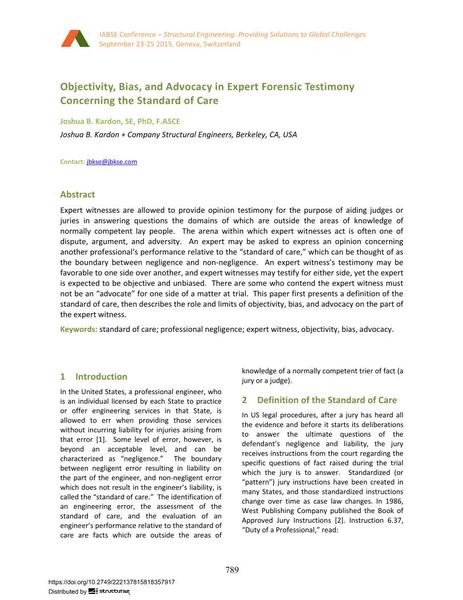Objectivity, Bias, and Advocacy in Expert Forensic Testimony Concerning the Standard of Care

|
|
|||||||||||
Bibliografische Angaben
| Autor(en): |
Joshua Kardon
(Joshua B. Kardon + Company Structural Engineers, Berkeley, CA, USA)
|
||||
|---|---|---|---|---|---|
| Medium: | Tagungsbeitrag | ||||
| Sprache(n): | Englisch | ||||
| Tagung: | IABSE Conference: Structural Engineering: Providing Solutions to Global Challenges, Geneva, Switzerland, September 2015 | ||||
| Veröffentlicht in: | IABSE Conference Geneva 2015 | ||||
|
|||||
| Seite(n): | 789-793 | ||||
| Anzahl der Seiten (im PDF): | 5 | ||||
| Jahr: | 2015 | ||||
| DOI: | 10.2749/222137815818357917 | ||||
| Abstrakt: |
Expert witnesses are allowed to provide opinion testimony for the purpose of aiding judges or juries in answering questions the domains of which are outside the areas of knowledge of normally competent lay people. The arena within which expert witnesses act is often one of dispute, argument, and adversity. An expert may be asked to express an opinion concerning another professional’s performance relative to the “standard of care,” which can be thought of as the boundary between negligence and non-negligence. An expert witness’s testimony may be favorable to one side over another, and expert witnesses may testify for either side, yet the expert is expected to be objective and unbiased. There are some who contend the expert witness must not be an “advocate” for one side of a matter at trial. This paper first presents a definition of the standard of care, then describes the role and limits of objectivity, bias, and advocacy on the part of the expert witness. |
||||
